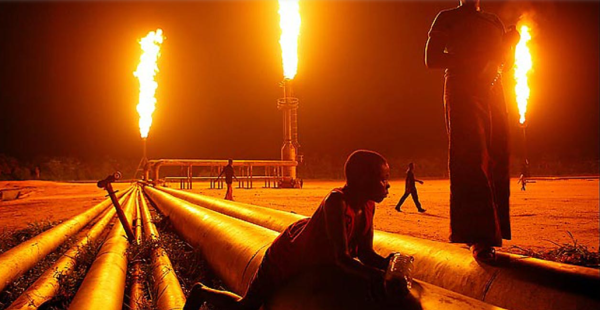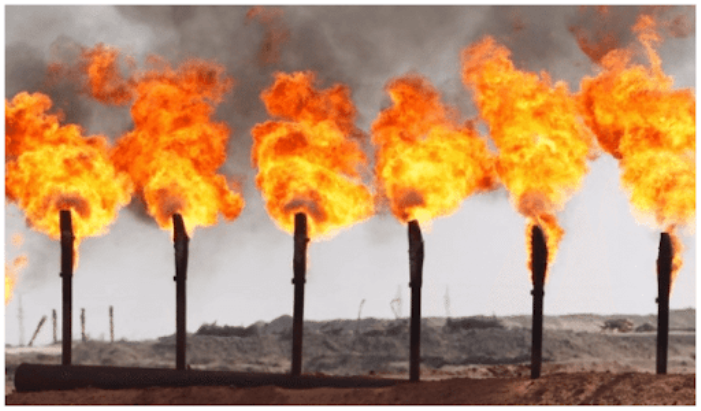This Article is about Problems and Prospects of gas flaring in Nigeria, Its Effects, solutions of Gas Flaring in Nigeria and Attempts to Regulate Gas Flaring.
The issue of gas flaring in Nigeria has become a topical one in view of the devastating effect gas flaring has in the socio-economic lives of the people in the affected areas. Historically, it is said that gas flaring is as old as oil production in Nigeria. Oil exploratory activities of oil companies in Nigeria have caused gas flaring resulting in loss of lives and properties in the affected communities where gas is flared. There is no specific legal framework that prohibits gas flaring in Nigeria in spite of the environmental problems associated with it.
The existing law that appears to regulate gas flaring in Nigeria is not effective as it does not completely prohibit gas flaring but only provide monetary penalties for continued flaring of gas by oil companies in Nigeria. The Judiciary therefore appeared to have championed the cause for the abolition of gas flaring in Nigeria. There are villages in Nigeria where it feels like the sun hasn’t fully set in years. Some 2 million people in the country’s Niger Delta live within 4 kilometers of a gas flare, a raging flame at an oil and gas extraction site that can be several stories high and emit so much noise that passers-by must shout to be heard.
Black carbon and methane are both powerful climate forcers and black carbon and VOCs are dangerous air pollutants. Nigeria is seventh on the list of the world’s top flaring countries, meaning that millions more around the world are subject to similar conditions, with countries like Venezuela, the United States, and Iran having even higher flaring rates, according to the World Bank.
Read on: OIL AND GAS AUTOMATION OPERATIONS IN NIGERIA
What is Gas Flaring?
Flaring occurs when crude oil is extracted from underground and natural gas is brought to the surface. Particularly in areas with limited infrastructure, this gas is burned off either at the top of a large stack or from a pit in the ground, often with devastating effects on local communities. In addition to the noise and light, flaring emits black carbon, methane, and volatile organic compounds.
Problems and Prospects
Historically, Gas flaring is said to be as old as oil exploration in Nigeria. Gas flaring contaminates the air and constitutes a major source of air pollution in the Niger Delta region of Nigeria. Available evidence suggests that most of the flare stacks/sites are located within human settlement area. Human Rights Watch stated that ‘in most cases gas flares are very close to communities. Although Shell Petroleum Development Company claims that this is usually because settlements have grown up around the oil facilities; local communities dispute this claim. In any event, the flares are rarely if ever relocated, or even made safe by providing secure fencing. A visit to some of the communities in the Niger Delta Region did affirm this assertion, as flare sites are located close to Uquo and Ubenekang communities in Esit Eket and Ibeno Local Government Areas respectively.
The effects of gas flaring are many but they can broadly be categorised under environmental, health and other implications. Over the past fifty years, gas flaring and venting associated with petroleum exploration and production in the Nigeria’s Niger Delta have continued to generate complex consequences in terms of energy, human health, natural environment, socio–economic environment and sustainable development Indeed, widespread gas flaring has inflicted untold hardship and damage to human, plant and animal life.
Read on: Gas Utilization Projects, Pipeline Projects and Investment Opportunities in Nigeria
Gas flaring contributes to climate change resulting in deleterious effects to the environment. The emission of carbon dioxide, burning of fossil fuel, mainly coal, oil and gas have led to global warming with more serious implications for developing countries, especially Africa which is highly vulnerable with limited ability to adapt.
Another notable effect of gas flaring is acid rain. The primary causes of acid rain are emissions of sulphur dioxide (SO2) and nitrogen oxides (NO) which combine with atmospheric moisture to form sulfuric acid and nitric acid respectively. Size and environmental philosophy in the industry have very strong positive impact on the gas-flaring-related CO2 emission. Physically, the corrosive effect of gas flaring was obvious in affected communities such as Ubenekang in Ibeno Local Government Area and Uquo community in Esit Eket Local Government Area of Akwa Ibom State where roofing sheets have to be replaced almost every two years. Furthermore, the flares associated with gas flaring give rise to atmospheric contaminants. These include oxides of Nitrogen, Carbon and Sulphur (NO2, CO2, CO, SO2), particulate matter, hydrocarbons and ash, photochemical oxidants, and hydrogen sulphide (H2S).
Effects of Gas Flaring
These contaminants acidify the soil, deplete soil nutrient and stunt the growth of crops. Agricultural products like palm trees are also affected and water becomes too hot for fish to live in accounting for the depletion of Fish stock in our rivers and oceans.
Read on: History Of Oil Spillage in Nigeria and the Oil Spill Act in Nigeria
The destructive effect of gas flaring on wildlife has also been noted. The bright light of gas flares scares wildlife causing them to migrate to more friendly territories or locations. The implication of gas flaring on human health has equally been identified. The pollutants are associated with a variety of adverse health impacts including respiratory tract diseases, diseases of the central nervous system and blood steam, cancers. Deformities in children, lung damage and skin problems have also been reported.

Rising temperatures which are likely to exceed 10-30 degrees with the heat potentially deadly as one approaches the flare sites have also been noticed. Villagers in both Ubenekang and Uquo communities reported that water in their rivers had become too hot for fish to survive and that plants and crops had withered away because of excessive heat from gas flares carried out in their communities.
In addition to the above consequences, there is yet another effect of gas flaring which is economic in nature. Nigeria loses billions of dollars’ worth of gas which is burnt off daily in the atmosphere. Much of this can be converted for domestic use and for electricity generation to meet national demand. Nigeria has recorded a huge revenue loss due to gas flaring and oil spillage. Though more than 65% of governmental revenue is from oil, it is estimated that about $2.5 billion is lost annually through gas flaring in government revenues.
Read on: OIL PRODUCTION NOW 1.7 MILLION BARRELS DAILY, SAYS FG
Solutions of Gas Flaring in Nigeria
Here are some environmentally friendly alternatives to gas flaring that oil and gas companies can utilize.
- Flare gas power generation
- Reinjection in secondary oil recovery
- Compressed natural gas
- Liquefied natural gas
- Petrochemical plants feedstock
- Gas-fired power plants & compressed natural gas fuel stations
- Development of viable gas markets
- Large-scaled industrial applications
Attempts to Regulate Gas Flaring
Gas flaring regulation is the responsibility of the state where the oil and gas well or landfill is located. Bans have been implemented on gas flaring, but these bans have been largely ineffective, especially in underdeveloped countries. Since the gas market in these countries is underdeveloped, oil sales represent a huge percentage of government income. In addition, many of that country’s oil fields also have associated gas fields in the same area. In order to effectively enforce a flaring ban, it would be necessary to shut down these fields, and that would eliminate the income they provide to government agencies. In some countries, bans would be more effective because the gas market is more mature. Some countries still have largely underdeveloped gas markets, which means placing bans on gas flaring would be ineffective. Unfortunately, those countries are also the biggest contributors to flare gas emitted into the atmosphere.
Conclusion
Gas flaring is controversial because it negatively affects the environment. That has made it a priority for some economical alternatives to be developed so that oil and gas companies can manage the flare gas in a more environmentally friendly manner. The carbon dioxide from gas flaring contributes significantly to the greenhouse gas emissions produced on earth. It would even be worse to vent flare gas directly as methane because this is even more harmful to the environment.

